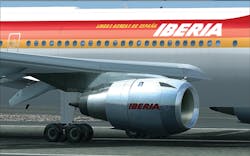Iberia Airlines Taxiing Program To Reduce Emissions At ORD
Iberia Airlines, Spain's largest air transport group, launched a single-engine taxi program Dec. 2, at O'Hare International Airport to reduce aircraft emissions and conserve fuel.
All aircraft utilize the thrust that is produced by their engines to taxi to or from the runway for takeoffs and landings, which burns expensive jet fuel and creates emissions. However, by shutting down an engine while taxiing, Iberia can reduce ground-level fuel burn and carbon dioxide emissions by 20 percent to 40 percent. Single-engine taxiing can also reduce emissions of nitrogen oxides by 10 percent to 30 percent, depending on the type of aircraft and pilot technique.
Iberia uses the four-engine Airbus A340 aircraft at O'Hare. Upon landing, the pilot shuts down two engines immediately after exiting the runway. Based on an average of nine minutes its planes spend taxiing after landings, Iberia estimates that it will save 352 pounds (160 kilograms) of fuel on the A340-300 model and 524 pounds (238 kilograms) of fuel on the A340-600 model per flight.
"On behalf of Mayor Rahm Emanuel, the City of Chicago and the Chicago Department of Aviation (CDA) commend Iberia Airlines and its parent, IAG, on its leadership and commitment to environmental protection and its eagerness to join the CDA in leading the aviation industry towards a more sustainable future," said CDA Commissioner Rosemarie S. Andolino. "As part of the CDA's efforts to reduce emissions associated with aircraft taxiing, we encourage all airlines to use single engine taxiing whenever practical, consistent with safety, pilot judgment, and federal regulations."
Iberia joins a number of airlines operating at O'Hare that use practices to reduce engine use while taxiing, including Alaska, American, ANA, Atlantic SE/Express Jet, British Air Cargo, ComAir, Delta, Kalitta Air, Pinnacle, and United.
The CDA also encourages towing aircraft between the gate and runways to reduce emissions and fuel consumption. Additionally, included in the O'Hare Modernization Program (OMP) are new high-speed exit taxiways to minimize taxiing distance and idling aircraft.
Iberia is Spain's largest air transport group and, after its merger with British Airways in January 2011, it has become the third-largest in Europe. It is also the leading airline on routes between Europe and Latin America, with the most flights and destinations.
Environmental protection is one of Iberia's corporate priorities. The company strives to maintain a balance between the development of its business and its impact on the environment. The average age of an aircraft in the Iberia fleet is eight years, one of the youngest and most efficient fleets in the industry. Iberia has continuously reduced its carbon dioxide emissions by almost 10 percent in recent years, mainly through fleet renewal and optimization of the occupation of the aircraft.
